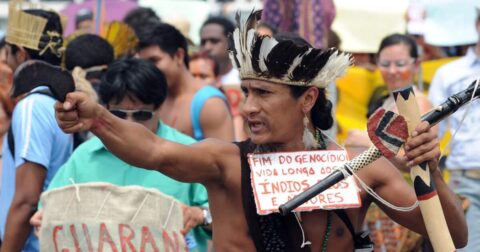Feature
Dairy and Meat Industries Push for Access to H-2A Farmworkers While the Trump Administration Slashes Their Pay
Policy•13 min read
Reported
An expansive new report shows that cheap poultry for markets, restaurants, and pets comes at the expense of Indigenous peoples in Brazil.


Words by Joseph Lee
European supermarket chains like Aldi and Sainsbury’s, European pet food producers, and Kentucky Fried Chicken restaurants in the U.K, profit from human rights abuses and Indigenous land theft in Brazil. That’s according to a new report that details human rights abuses in a chicken supply chain from Brazil to Europe. The report comes amid violence against Indigenous communities in Brazil, and specifically in the state of Mato Grosso do Sul, where rampant deforestation and violent attacks against the Guarani Kaiowá continue to escalate.
The report, released by Earthsight, a UK-based nonprofit, and De Olho nos Ruralistas, a Brazilian agribusiness watch group, traces major international companies’ chicken production back to Brasilia do Sul, a 23,000-acre soy farm in the state of Mato Grosso do Sul, built on Guarani Kaiowá land. Evicted from their territory in the 1950s, the land was deforested over the years while the Guarani Kaiowá fought unsuccessfully in Brazil’s courts to regain title to their land. In 2003, a Guarani Kaiowá leader, Marcos Veron, was beaten to death by Brasilia do Sul workers and hired gunmen after leading an effort to reclaim a portion of the territory.
“When we’re not struck by gunmen we’re struck by the courts,” said Valdelice Veron, a Guarani Kaiowá leader and Marcos’ daughter. “The aim of Brazil’s rulers is the extermination of our people. My message to you watching our situation in Mato Grosso do Sul and in Brazil is that you rise up with us.”
According to the report, the supply chain works like this: Lar Cooperativa Agroindustrial, Brazil’s fourth-largest chicken slaughtering company, is a significant buyer of Brasília do Sul soy, which it uses to feed chickens that it sells internationally. Westbridge Foods, a British poultry supplier, buys thousands of tons of chicken from Lar Cooperativa to supply supermarkets like Sainsbury’s and Aldi, as well as restaurants like Kentucky Fried Chicken. Also buying from Lar Cooperativa is German firm Paulsen Food, which supplies pet food companies and uses the chicken in dog and cat food.
“Businesses in Britain have failed to cut ties with Brazilian producers linked to the violence, making us consumers unwitting participants in tragic stories like that of the Guarani Kaiowá,” said Rubens Carvalho, Earthsight’s head of deforestation research.
“All our suppliers have to meet our strict ethical and sustainable sourcing standards. Westbridge does not source any of our own brand chicken from Brazil,” wrote Sainsbury’s in a statement.
Westbridge and Kentucky Fried Chicken did not immediately respond to a request for comment.
“All three retailers seem to be relying solely on Westbridge’s assurances about the origin of their chicken,” reads the report.
Earthsight called on the European Union and the United Kingdom to make reforms to chicken and soy supply chain regulations, and Earthsight’s Ruben Carvalho said that the findings demonstrate the need for stronger legislation that includes “the protection of indigenous land rights, and to cover key commodities, including soy and soy-fed chicken.”
The Guarani Kaiowá’s fight is part of a larger, global effort to protect land and the environment as research shows that Indigenous land stewardship is crucial to preserving biodiversity and combating climate change. “Our aim is to restore the health of the land to allow us to reconnect with this divinity and give meaning to our lives,” Eliel Benites, a Guarani Kaiowá leader and academic, said in the report.
Across Brazil, Indigenous people are being killed by illegal mining and advancing agribusiness activities. Since 2003, over 500 Indigenous people have been killed in the state of Mato Grosso do Sul—more than any other region and a third of all Indigenous killings in Brazil during that time and primarily due to expanding agribusiness. “Many massacres have happened for us to be here today,” said Valdelice Veron, the Guarani Kaiowá leader, in the report. “We’re here because this is our sacred land, it’s where we have our history and our memory. It’s our Tekohá [sacred village] and we don’t forget it.”